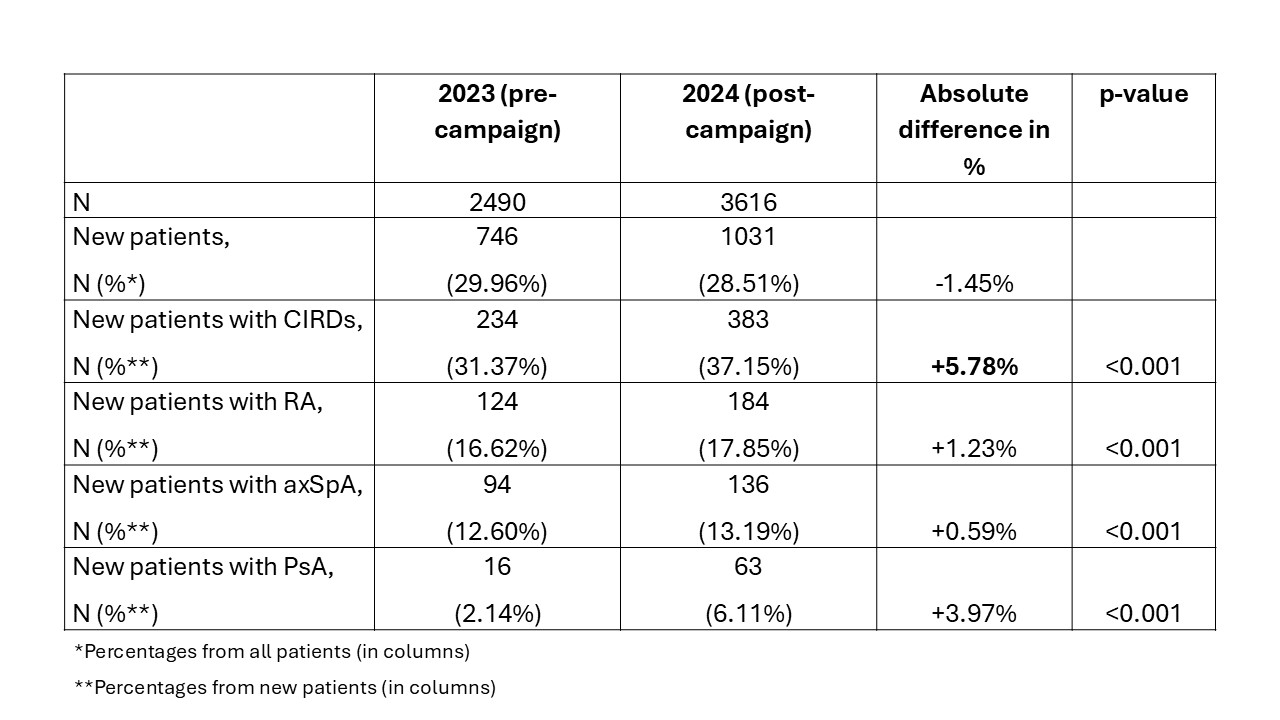Session Information
Session Type: Poster Session C
Session Time: 10:30AM-12:30PM
Background/Purpose: Delayed diagnosis and treatment in chronic inflammatory rheumatic diseases (CIRDs), including rheumatoid arthritis (RA), axial spondyloarthritis (axSpA), and psoriatic arthritis (PsA), is associated with poorer clinical outcomes. Although referral algorithms exist, there is limited evidence on the real-world effectiveness of awareness campaigns in improving referral practices to rheumatology.The objective of this study was to assess the impact of a multinational awareness campaign on referral trends and diagnostic delays for CIRDs across Arab countries.
Methods: This prospective pre-post interventional study was conducted in eight Arab countries between November 2023 and November 2024. Baseline data on referral patterns and diagnostic delays were collected in November 2023. Diagnostic delay was defined as the interval from symptom onset to confirmed diagnosis in newly diagnosed CIRD patients. From December 2023 to October 2024, a structured awareness campaign targeted primary care physicians and non-rheumatology specialists. The campaign featured live webinars (n=9), social media dissemination via the Arab League of Associations for Rheumatology (ArLAR) channels, and in-person workshops held in September–October 2024 (n=22), using a previously validated referral algorithm. The primary outcome was the change in the proportion of newly referred RA, axSpA, and PsA patients (collectively referred to as CIRDs) across 14 high-volume rheumatology centers. Secondary outcomes included time intervals from symptom onset to first physician contact and to rheumatologic diagnosis. Descriptive statistics were presented using medians and interquartile ranges (IQRs). Multivariable linear regression was used to identify factors associated with diagnostic delays.
Results: In November 2024, 3616 patients were seen across the 14 clinics, including 1031 (28.5%) new patients, of whom 383 (37.1%) were newly diagnosed with CIRDs (RA: n=184; axSpA: n=136; PsA: n=63). Compared to baseline, the proportion of newly referred CIRD cases increased by 5.8% (from 31.4% to 37.1%, p< 0.001). Subgroup increases were observed in RA (from 16.6% to 17.8%), axSpA (12.6% to 13.2%), and PsA (2.1% to 6.1%) (Table 1). Among 365 newly diagnosed CIRD patients (mean age 42.6±15.2 years; 62.7% female), the median time from symptom onset to diagnosis decreased from 18.4 months (IQR 5.8–48.7) to 12.0 months (IQR 4.0–36.0). Reductions were also observed by disease subtype: RA (12.2 to 9.0 months), axSpA (36.5 to 27.5 months), and PsA (24.3 to 12.0 months) (Figure 1). Multivariable analysis identified longer disease duration (B=4.969, p< 0.001), lower educational attainment (B=10.589, p=0.015), and longer time to rheumatologist consultation (B=0.727, p< 0.001) as independent predictors of diagnostic delay.
Conclusion: This multinational intervention was associated with increased rheumatology referrals and significantly reduced diagnostic delays for patients with CIRDs. While causality cannot be definitively established, the findings support the value of targeted awareness strategies in improving early access to rheumatologic care. Further longitudinal studies are recommended to evaluate sustained impact.
 Table 1. Change in the proportion of new patients referred to 14 high-volume rheumatology clinics in 8 countries, before and after the multinational awareness campaign
Table 1. Change in the proportion of new patients referred to 14 high-volume rheumatology clinics in 8 countries, before and after the multinational awareness campaign
.jpg) Figure 1. Key timelines in the referral of new patients with CIRDs to rheumatology, before and after the multinational awareness campaign
Figure 1. Key timelines in the referral of new patients with CIRDs to rheumatology, before and after the multinational awareness campaign
To cite this abstract in AMA style:
Ziade N, Mechleb K, Alnaimat F, Gamal S, Maroof A, Elzorkany B, Mashaleh M, El Rakawi M, Adly M, Elkibbi L, Mariam E, Aouad K, Haouichat C, Abdullateef N, RIDHA A, Baron F, Hmamouchi I. Can a Multinational Awareness Campaign Improve Referral Rates and Reduce Diagnostic Delays in Patients with Chronic Inflammatory Rheumatic Diseases? The Impact of a Prospective Interventional Study [abstract]. Arthritis Rheumatol. 2025; 77 (suppl 9). https://acrabstracts.org/abstract/can-a-multinational-awareness-campaign-improve-referral-rates-and-reduce-diagnostic-delays-in-patients-with-chronic-inflammatory-rheumatic-diseases-the-impact-of-a-prospective-interventional-study/. Accessed .« Back to ACR Convergence 2025
ACR Meeting Abstracts - https://acrabstracts.org/abstract/can-a-multinational-awareness-campaign-improve-referral-rates-and-reduce-diagnostic-delays-in-patients-with-chronic-inflammatory-rheumatic-diseases-the-impact-of-a-prospective-interventional-study/
